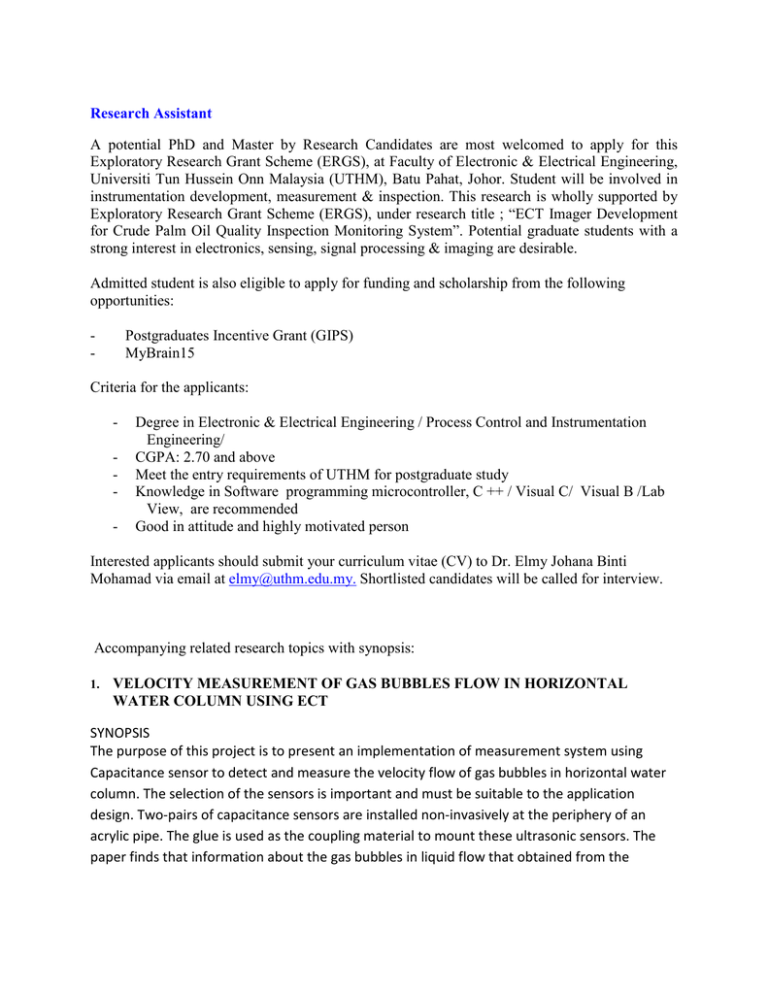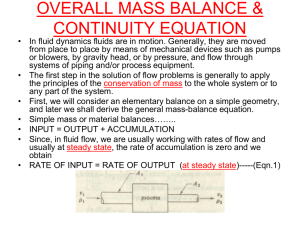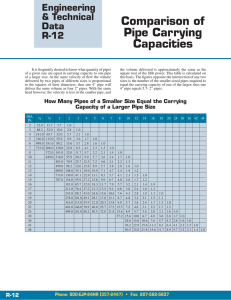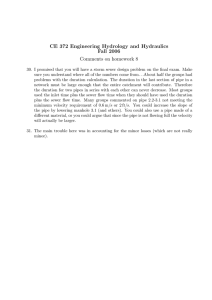Research Assistant A potential PhD and Master by
advertisement

Research Assistant A potential PhD and Master by Research Candidates are most welcomed to apply for this Exploratory Research Grant Scheme (ERGS), at Faculty of Electronic & Electrical Engineering, Universiti Tun Hussein Onn Malaysia (UTHM), Batu Pahat, Johor. Student will be involved in instrumentation development, measurement & inspection. This research is wholly supported by Exploratory Research Grant Scheme (ERGS), under research title ; “ECT Imager Development for Crude Palm Oil Quality Inspection Monitoring System”. Potential graduate students with a strong interest in electronics, sensing, signal processing & imaging are desirable. Admitted student is also eligible to apply for funding and scholarship from the following opportunities: - Postgraduates Incentive Grant (GIPS) MyBrain15 Criteria for the applicants: - Degree in Electronic & Electrical Engineering / Process Control and Instrumentation Engineering/ CGPA: 2.70 and above Meet the entry requirements of UTHM for postgraduate study Knowledge in Software programming microcontroller, C ++ / Visual C/ Visual B /Lab View, are recommended Good in attitude and highly motivated person Interested applicants should submit your curriculum vitae (CV) to Dr. Elmy Johana Binti Mohamad via email at elmy@uthm.edu.my. Shortlisted candidates will be called for interview. Accompanying related research topics with synopsis: 1. VELOCITY MEASUREMENT OF GAS BUBBLES FLOW IN HORIZONTAL WATER COLUMN USING ECT SYNOPSIS The purpose of this project is to present an implementation of measurement system using Capacitance sensor to detect and measure the velocity flow of gas bubbles in horizontal water column. The selection of the sensors is important and must be suitable to the application design. Two-pairs of capacitance sensors are installed non-invasively at the periphery of an acrylic pipe. The glue is used as the coupling material to mount these ultrasonic sensors. The paper finds that information about the gas bubbles in liquid flow that obtained from the sensors’ measurements. At the end of this project, the data that obtained able to used in working computed controlling, monitoring in related industrial process. 2. SEPARATION SYSTEM FOR HORIZONTAL MULTIPHASE FLOW REGIME USING ECT SYNOPSIS The work presents an investigation on the use of ECT sensors for separation process in horizontal flow regime. In today's, most process have involved the utilization of various pipes or vessels. They use mixture of products that are pumped along pipes (combination product). For example, particulate materials (plastic, grain, and catalysts) are disseminated along pipes by compressed air or pumped in liquid manufacturing process. However, the measurement of the amount delivered can only be done in one way which using conventional flow meter. The limitation is not inherent to the pumping mechanism, it is simply because the technology for measuring the velocity not yet being approach in the market. In this project, capacitance sensor and Tomograpic technique will be developed to monitor the flow distributions process. 3. CROSS CORRELATION FLOW METERS FOR HORIZONTAL FLOW REGIME USING LIGHT EMITTING DIODE (LED) AS A LIGHT SOURCE SYNOPSIS Flow measurement is the quantification of bulk particles movement. It can be measured in a variety of ways. One of them is by measured the velocity. Flow velocity is an importance flow characteristic foe analysis. Excessively high particle velocity will cause high energy consumption, severe pipeline wear and particle degradation. In this project, a twin plane sensor and cross correlation technique will be developed using Light Emitting Diode to measure the velocity distributions such as a flow meter. The cross correlation principle measure liquid velocities by sensing the passage of some disturbance in the flow at one position, and measuring how long time (transit time) requires that disturbance to travel to the next point. The signals from the sensor plane 1 are cross-correlated with the signals from sensor plane 2 to obtain the velocity profile in multiphase flow. 4. WATER PIPES LEAK DETECTION USING EM WAVES FOR THE WATER INDUSTRY SYNOPSIS This project concerns the use of an electromagnetic sensor for the detection of leaks/cracks in water pipes. As old metal pipes corrode, they start to become brittle, resulting in the potential for cracks to appear in the pipes. In addition the corrosion can build up resulting in a restricted flow of water in the pipe. By using an electromagnetic sensor to monitor the signal reflected from the pipes, this will provide the necessary information to determine where a leak in the pipe has a problem because of the change in the reflected signal. By analysing the reflected signal, we can determine the condition of leak within the pipe, and therefore can report back to the operator. This paper presents an overview of the system designed, and also its construction in a scale suitable for insertion into a 100 mm diameter water pipe. 5. CAPACITIVELY COUPLED ELECTRICAL RESISTANCE TOMOGRAPHY SYSTEM (CCERT) SYNOPSIS The direct contact between the electrodes of the electrical resistance tomography and liquid may result inelectrode corrosion and polarization, which limits the application of ERT in industry. This paper develops a capacitively coupled electrical resistance tomography system (CCERT). This system can measure the conductivity of liquid between electrodes without contact with the liquid. A 12-electrodes prototype system is developed and its data acquisition system is designed to implement the resistance measurement. To test the system performance, the experiment is implemented. Experiment results show that the conductivity distribution images inside the pipe can be reconstructed. Best Regards; Dr. ELMY JOHANA BINTI MOHAMAD Lecturer Department of Mechatronic and Robotic Faculty of Electrical and Electronic Engineering Tun Hussein Onn University of Malaysia Tel: 453 8354 H/P: 019-7507576 Email: elmy@uthm.edu.my



